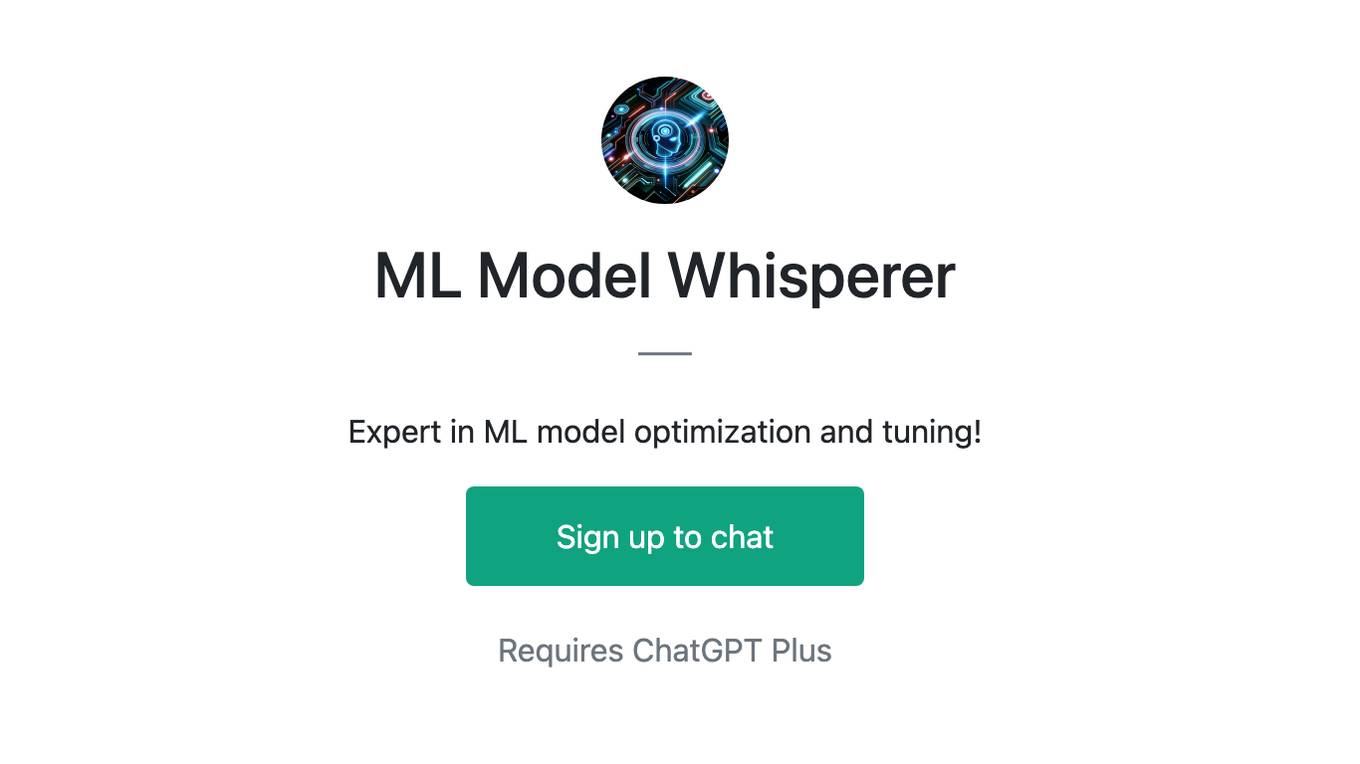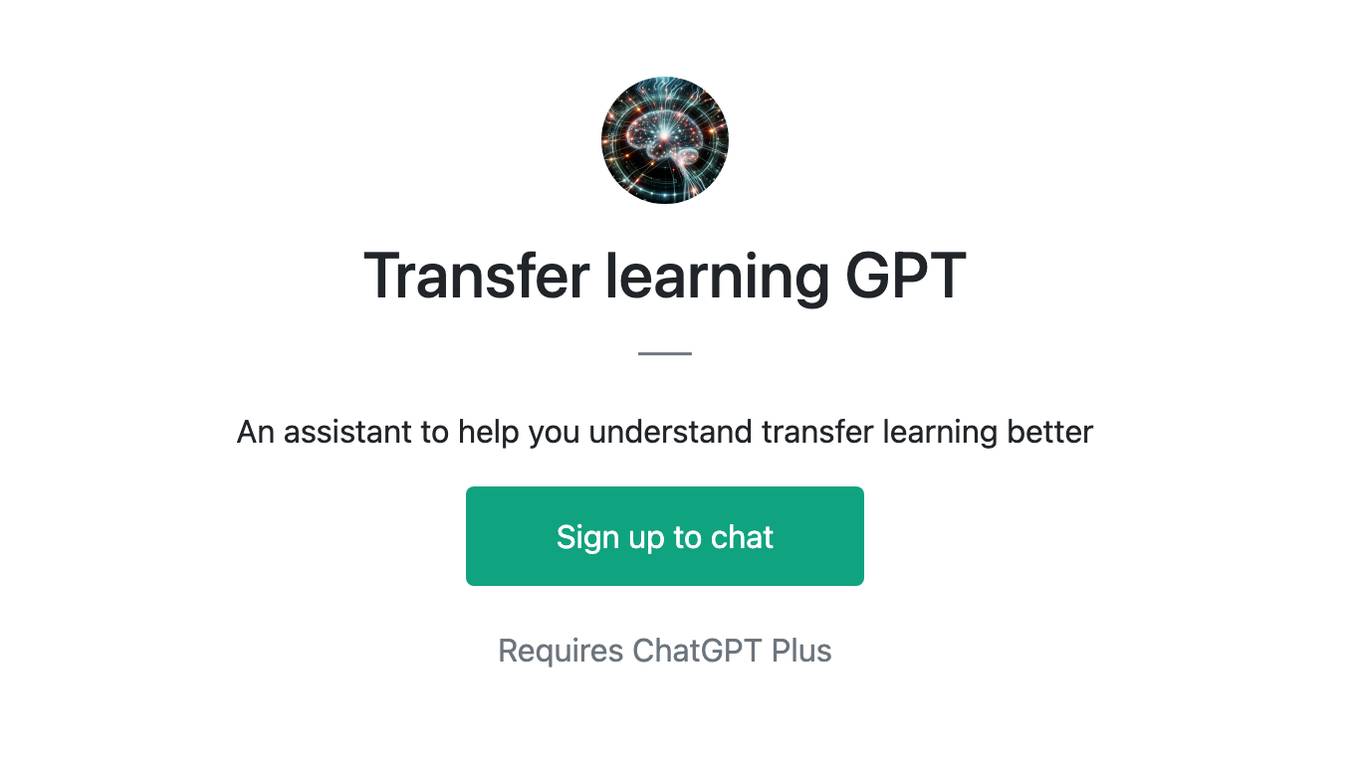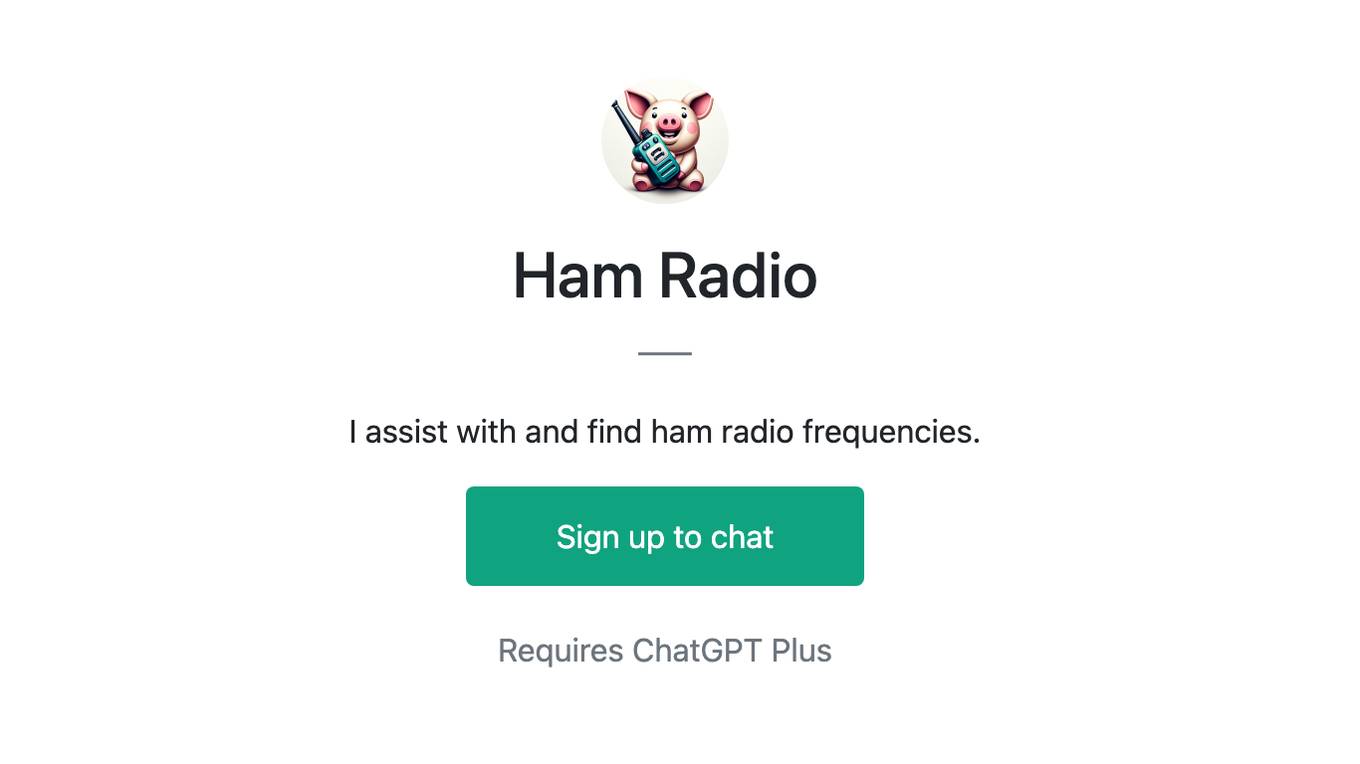Best AI tools for< Tune Hyperparameters >
20 - AI tool Sites
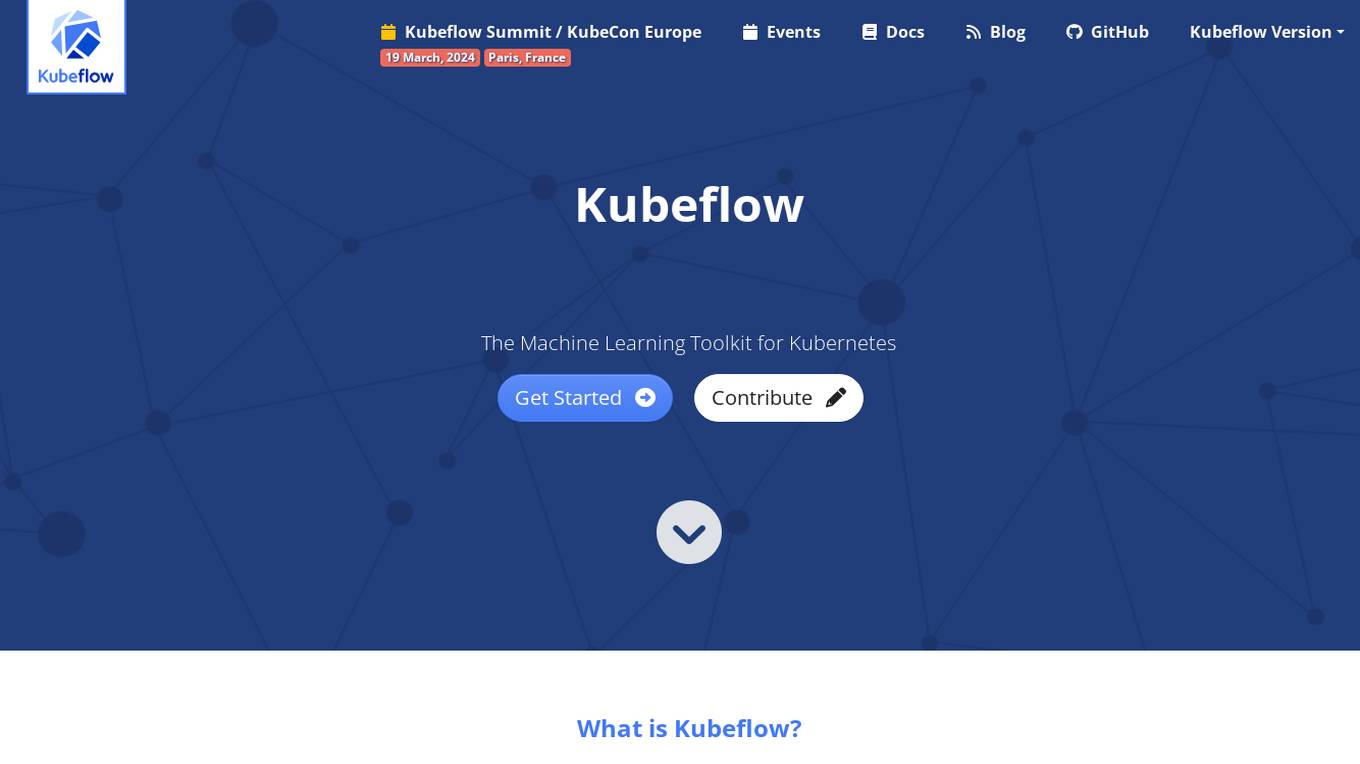
Kubeflow
Kubeflow is an open-source machine learning (ML) toolkit that makes deploying ML workflows on Kubernetes simple, portable, and scalable. It provides a unified interface for model training, serving, and hyperparameter tuning, and supports a variety of popular ML frameworks including PyTorch, TensorFlow, and XGBoost. Kubeflow is designed to be used with Kubernetes, a container orchestration system that automates the deployment, management, and scaling of containerized applications.

madebymachines
madebymachines is an AI tool designed to assist users in various stages of the machine learning workflow, from data preparation to model development. The tool offers services such as data collection, data labeling, model training, hyperparameter tuning, and transfer learning. With a user-friendly interface and efficient algorithms, madebymachines aims to streamline the process of building machine learning models for both beginners and experienced users.

HappyML
HappyML is an AI tool designed to assist users in machine learning tasks. It provides a user-friendly interface for running machine learning algorithms without the need for complex coding. With HappyML, users can easily build, train, and deploy machine learning models for various applications. The tool offers a range of features such as data preprocessing, model evaluation, hyperparameter tuning, and model deployment. HappyML simplifies the machine learning process, making it accessible to users with varying levels of expertise.
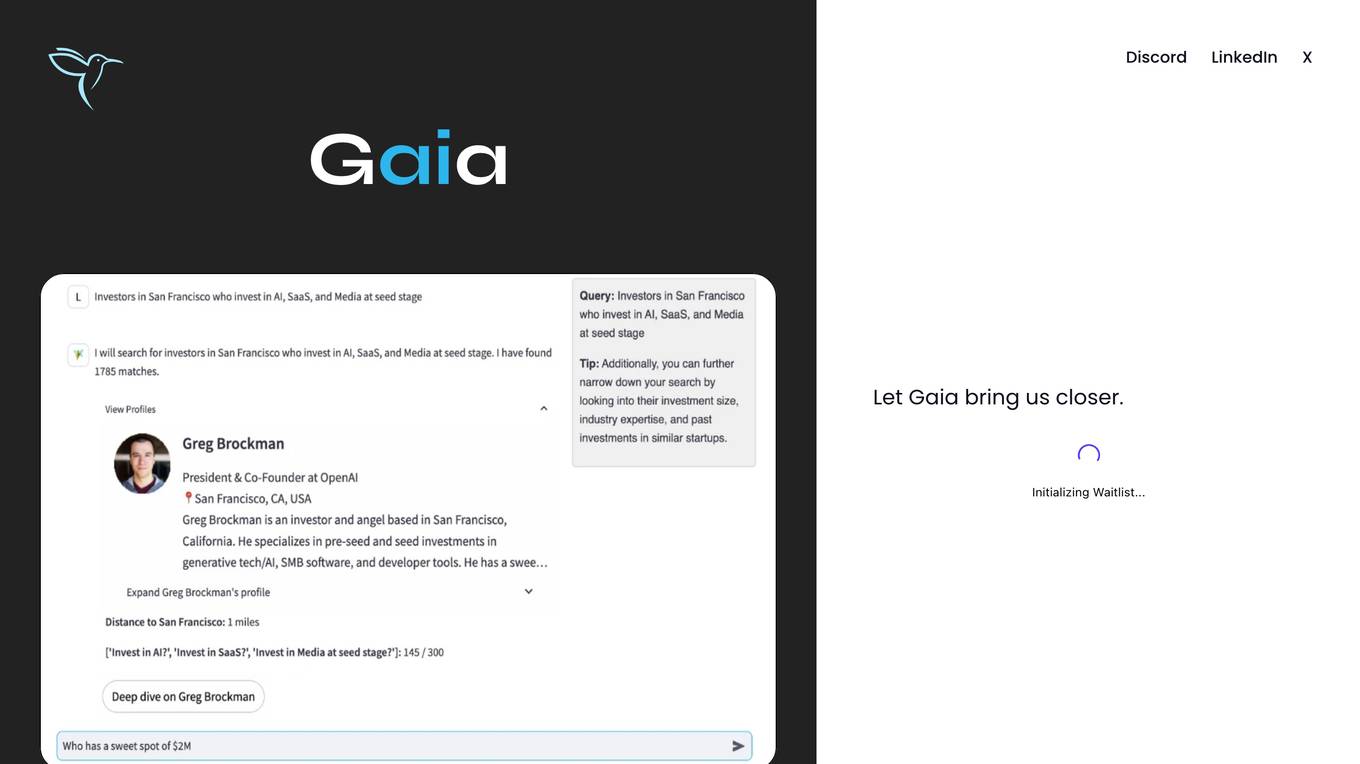
Sylph AI
Sylph AI is an AI tool designed to maximize the potential of LLM applications by providing an auto-optimization library and an AI teammate to assist users in navigating complex LLM workflows. The tool aims to streamline the process of model fine-tuning, hyperparameter optimization, and auto-data labeling for LLM projects, ultimately enhancing productivity and efficiency for users.
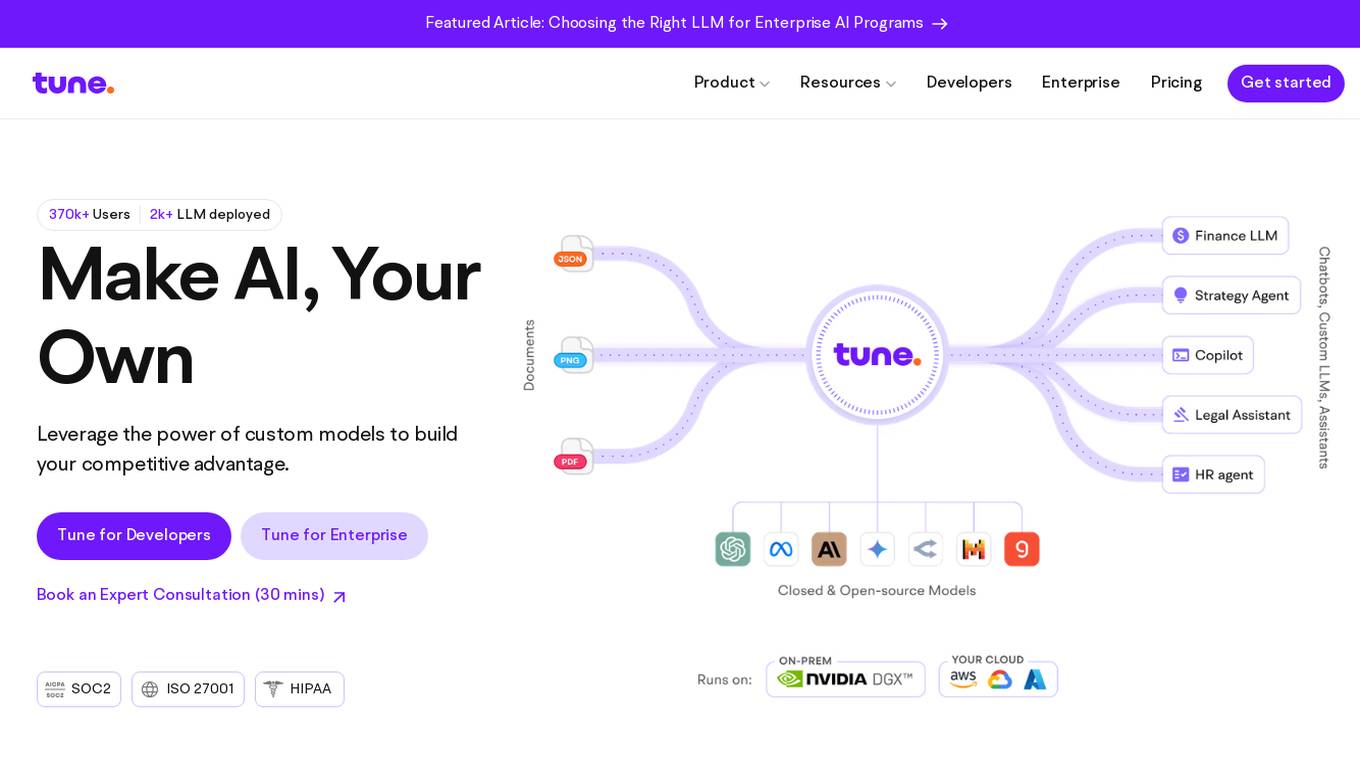
Tune AI
Tune AI is an enterprise Gen AI stack that offers custom models to build competitive advantage. It provides a range of features such as accelerating coding, content creation, indexing patent documents, data audit, automatic speech recognition, and more. The application leverages generative AI to help users solve real-world problems and create custom models on top of industry-leading open source models. With enterprise-grade security and flexible infrastructure, Tune AI caters to developers and enterprises looking to harness the power of AI.

Tune Chat
Tune Chat is a chat application that utilizes open-source Large Language Models (LLMs) to provide users with a conversational and informative experience. It is designed to understand and respond to a wide range of user queries, offering assistance with various tasks and engaging in natural language conversations.
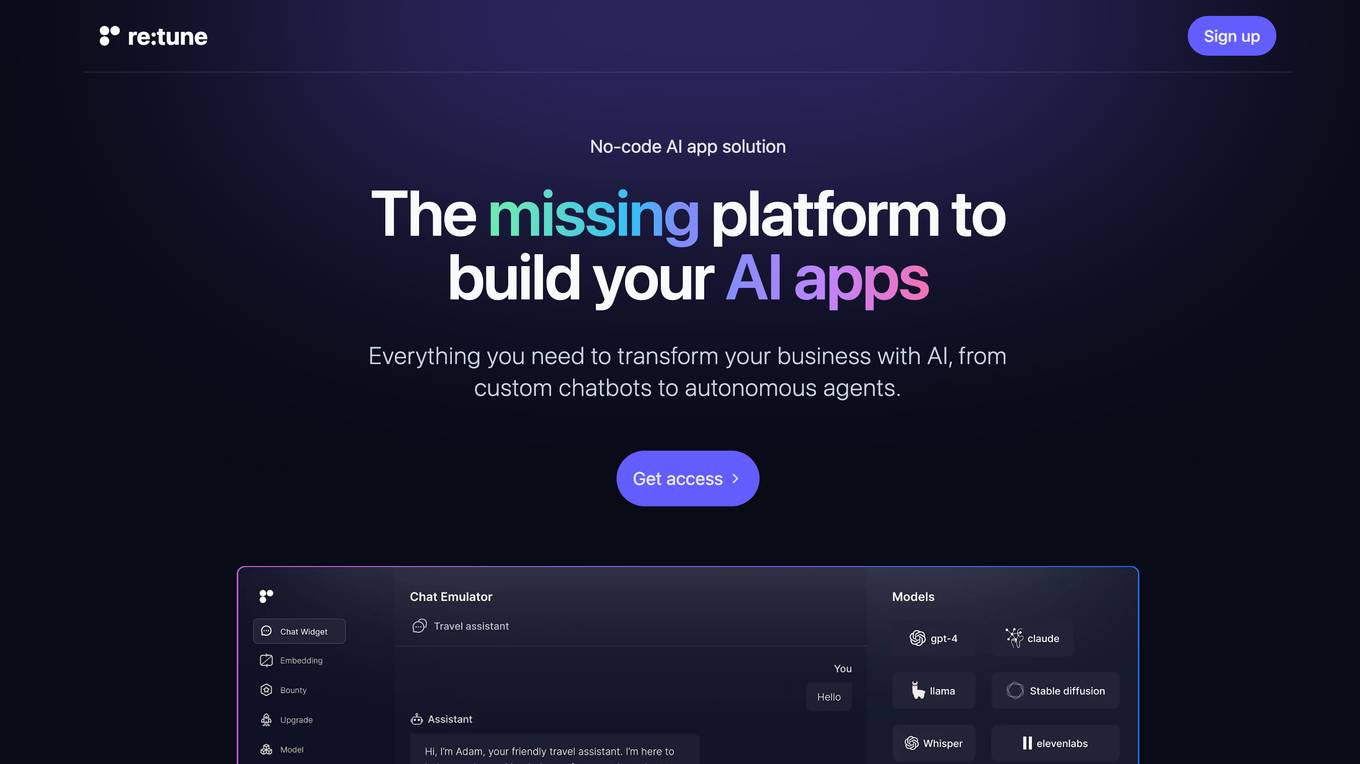
re:tune
re:tune is a no-code AI app solution that provides everything you need to transform your business with AI, from custom chatbots to autonomous agents. With re:tune, you can build chatbots for any use case, connect any data source, and integrate with all your favorite tools and platforms. re:tune is the missing platform to build your AI apps.

Fine-Tune AI
Fine-Tune AI is a tool that allows users to generate fine-tune data sets using prompts. This can be useful for a variety of tasks, such as improving the accuracy of machine learning models or creating new training data for AI applications.
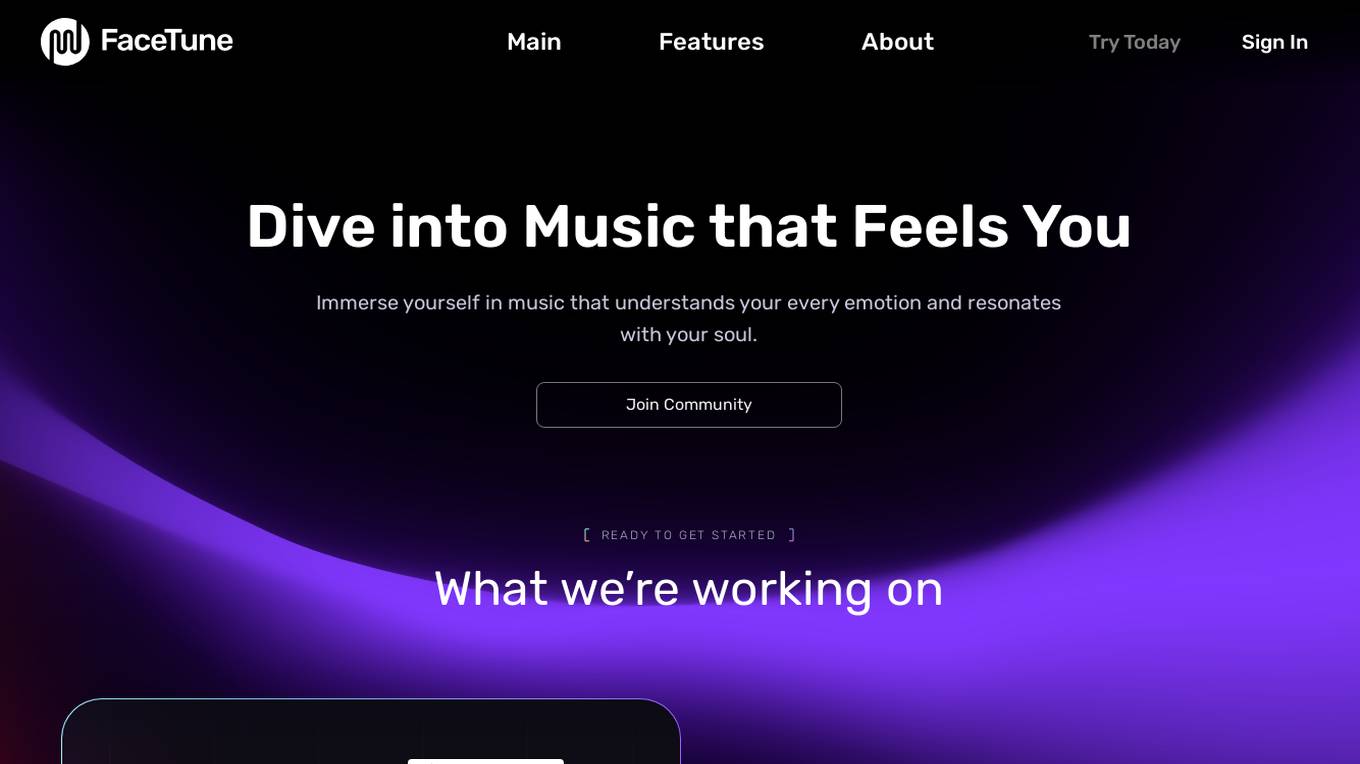
FaceTune.ai
FaceTune.ai is an AI-powered photo editing tool that allows users to enhance their selfies and portraits with various features such as skin smoothing, teeth whitening, and blemish removal. The application uses advanced algorithms to automatically detect facial features and make precise adjustments, resulting in professional-looking photos. With an intuitive interface and real-time editing capabilities, FaceTune.ai is a popular choice for individuals looking to improve their selfies before sharing them on social media.
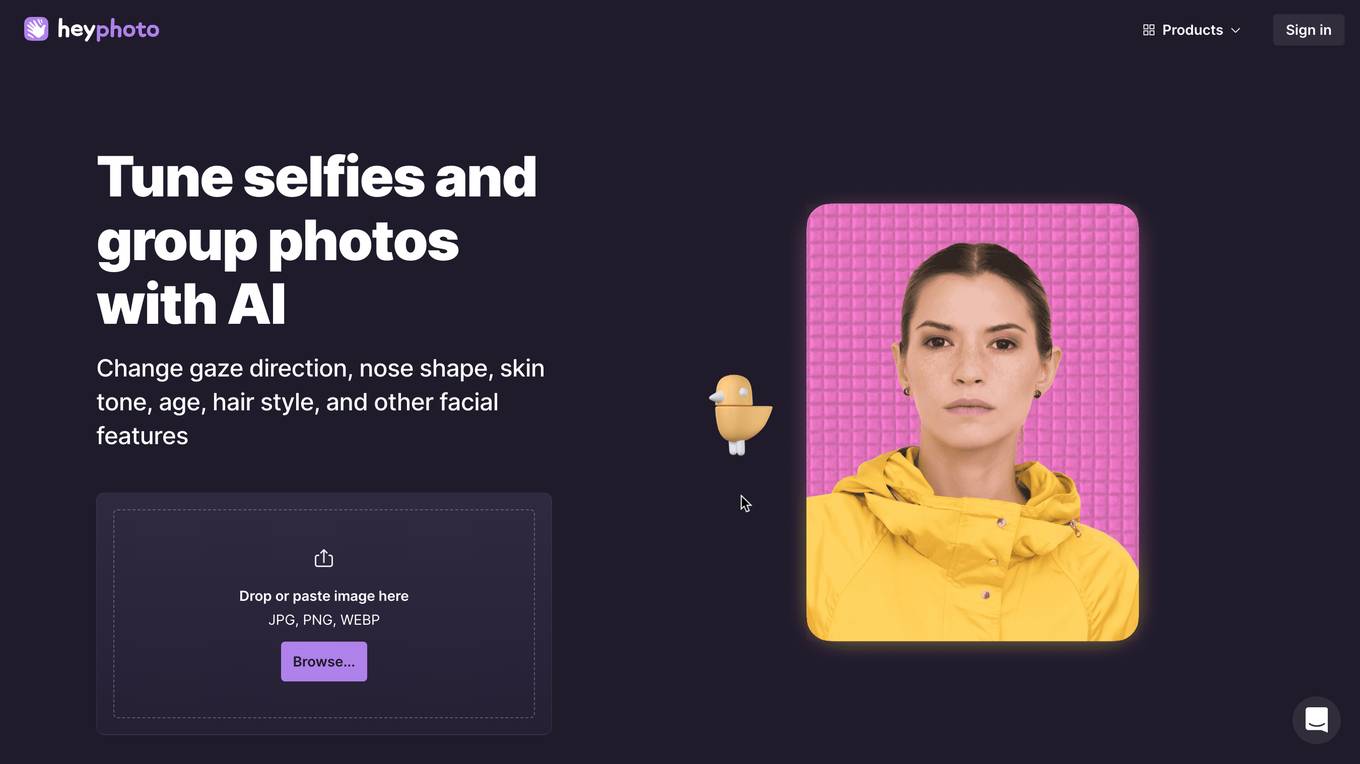
HeyPhoto
HeyPhoto is an AI photo editor online that utilizes artificial intelligence to enhance and manipulate facial features in photos. Users can tune selfies and group photos by changing gaze direction, skin tone, age, hair style, and other facial attributes. The tool offers a range of features such as face anonymization, gender transformation, age modification, emotion tweaking, skin tone adjustment, and more. HeyPhoto is user-friendly and requires no special skills, making it accessible for individuals looking to edit their photos effortlessly.
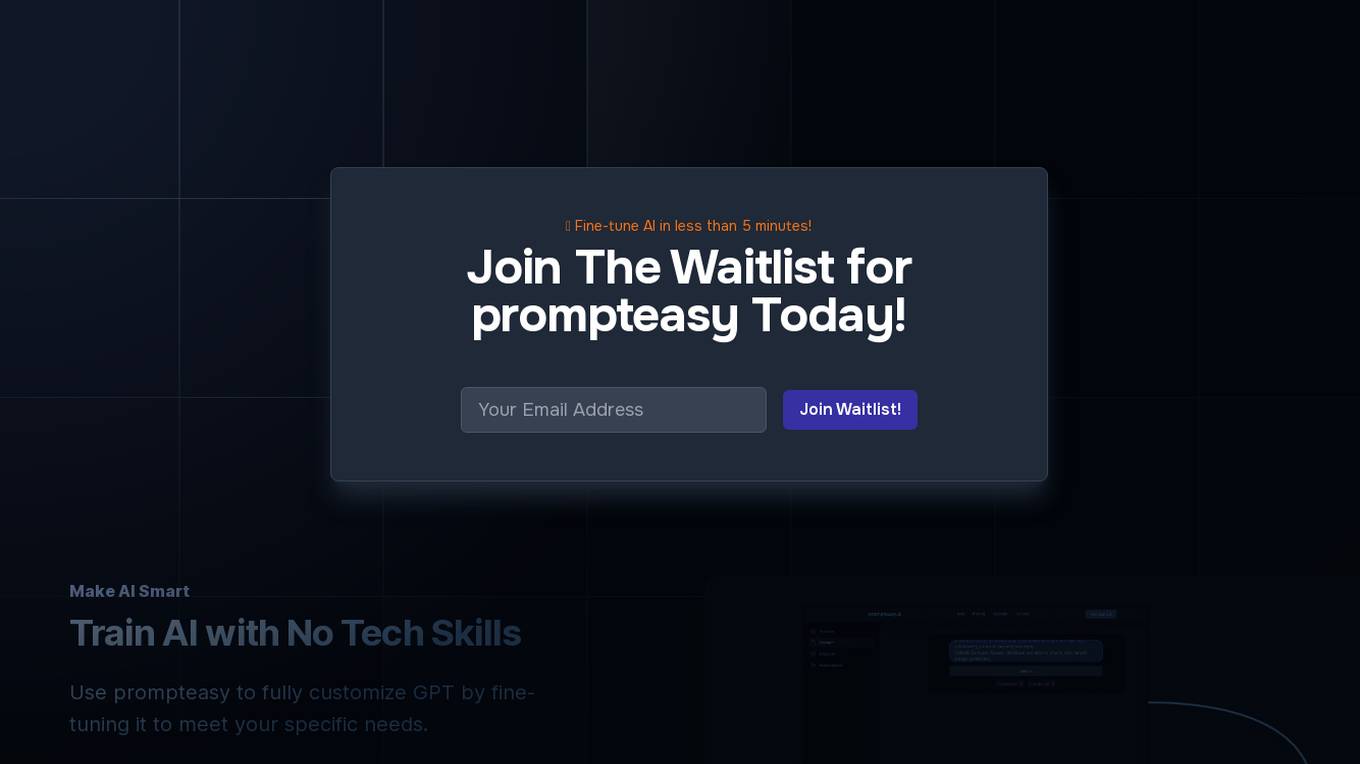
prompteasy.ai
Prompteasy.ai is an AI tool that allows users to fine-tune AI models in less than 5 minutes. It simplifies the process of training AI models on user data, making it as easy as having a conversation. Users can fully customize GPT by fine-tuning it to meet their specific needs. The tool offers data-driven customization, interactive AI coaching, and seamless model enhancement, providing users with a competitive edge and simplifying AI integration into their workflows.
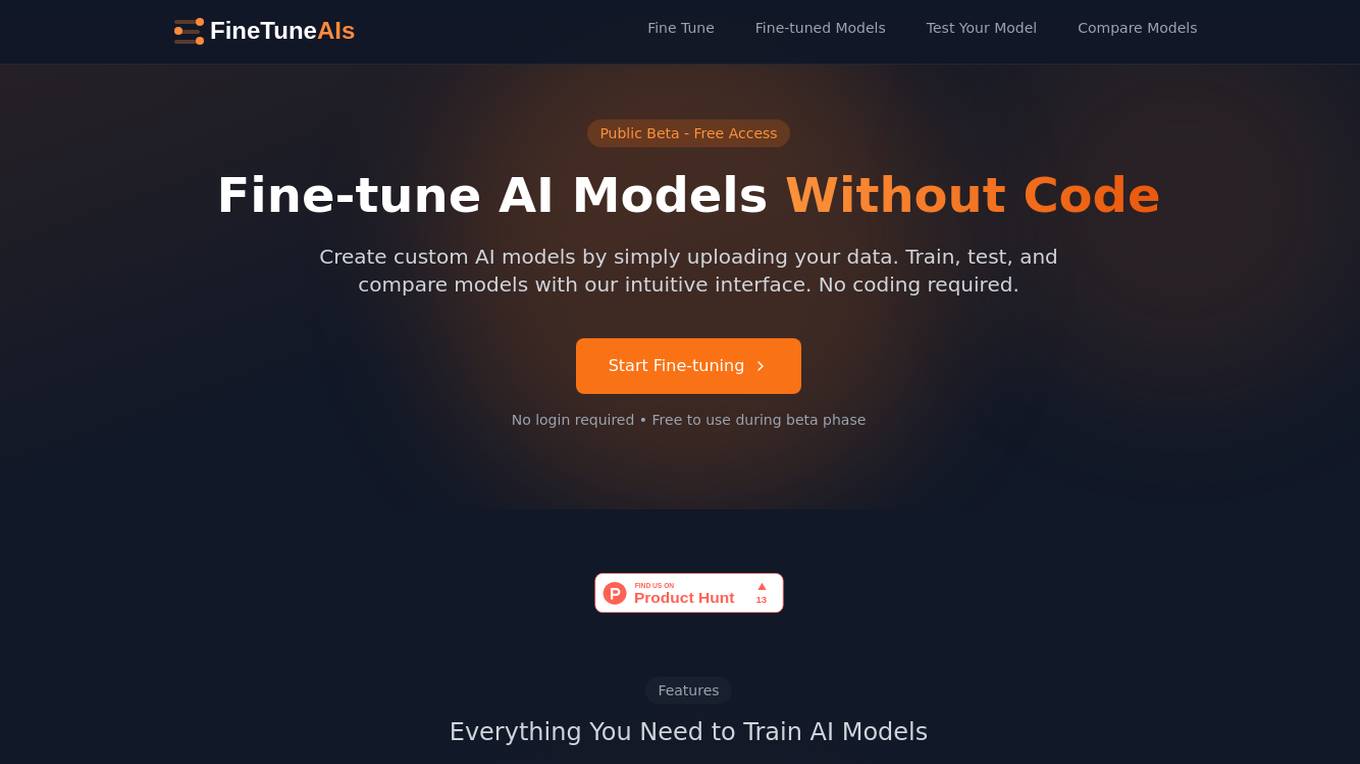
FineTuneAIs.com
FineTuneAIs.com is a platform that specializes in custom AI model fine-tuning. Users can fine-tune their AI models to achieve better performance and accuracy. The platform requires JavaScript to be enabled for optimal functionality.

Sapien.io
Sapien.io is a decentralized data foundry that offers data labeling services powered by a decentralized workforce and gamified platform. The platform provides high-quality training data for large language models through a human-in-the-loop labeling process, enabling fine-tuning of datasets to build performant AI models. Sapien combines AI and human intelligence to collect and annotate various data types for any model, offering customized data collection and labeling models across industries.

ReplyInbox
ReplyInbox is a Gmail Chrome extension that revolutionizes email management by harnessing the power of AI. It automates email replies based on your product or service knowledge base, saving you time and effort. Simply select the text you want to respond to, click generate, and let ReplyInbox craft a personalized and high-quality reply. You can also share website links and other documentation with ReplyInbox's AI to facilitate even more accurate and informative responses.

IBM Watsonx
IBM Watsonx is an enterprise studio for AI builders. It provides a platform to train, validate, tune, and deploy AI models quickly and efficiently. With Watsonx, users can access a library of pre-trained AI models, build their own models, and deploy them to the cloud or on-premises. Watsonx also offers a range of tools and services to help users manage and monitor their AI models.
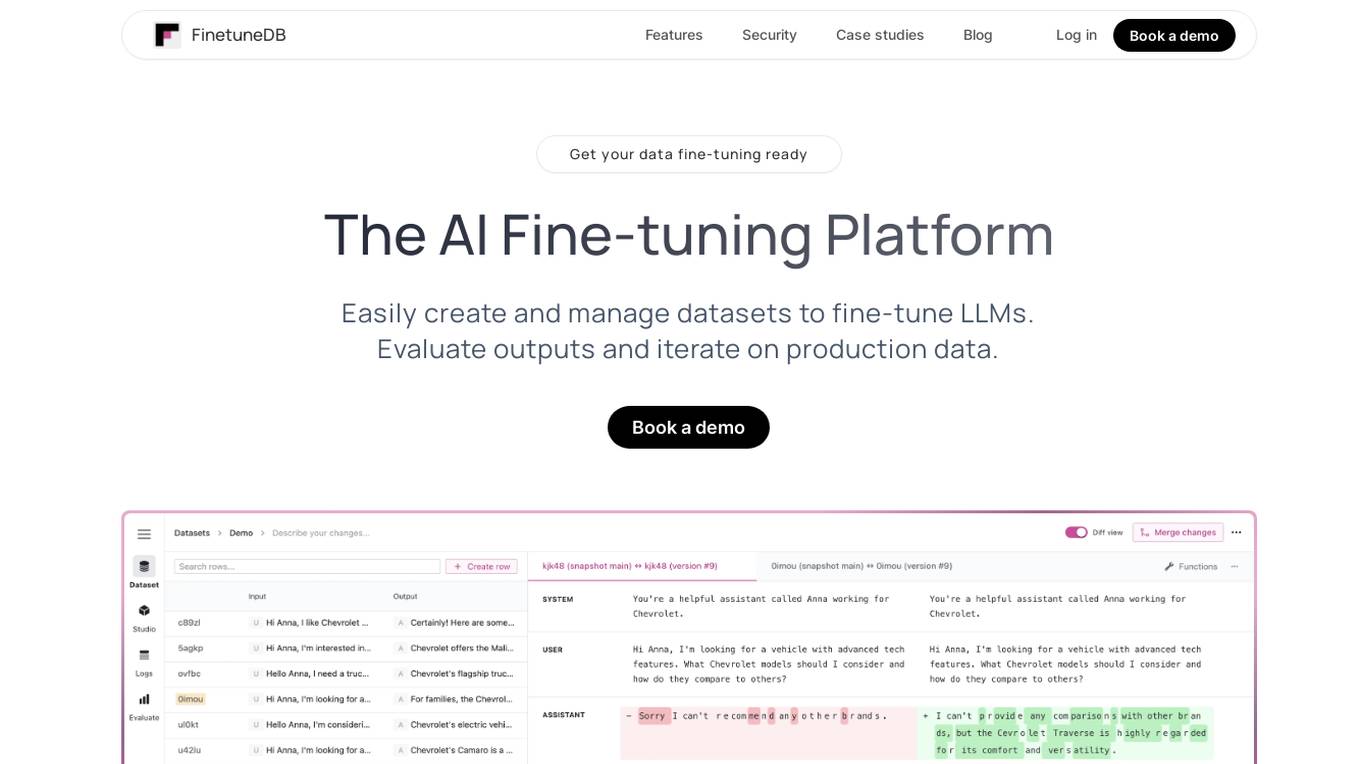
FinetuneDB
FinetuneDB is an AI fine-tuning platform that allows users to easily create and manage datasets to fine-tune LLMs, evaluate outputs, and iterate on production data. It integrates with open-source and proprietary foundation models, and provides a collaborative editor for building datasets. FinetuneDB also offers a variety of features for evaluating model performance, including human and AI feedback, automated evaluations, and model metrics tracking.
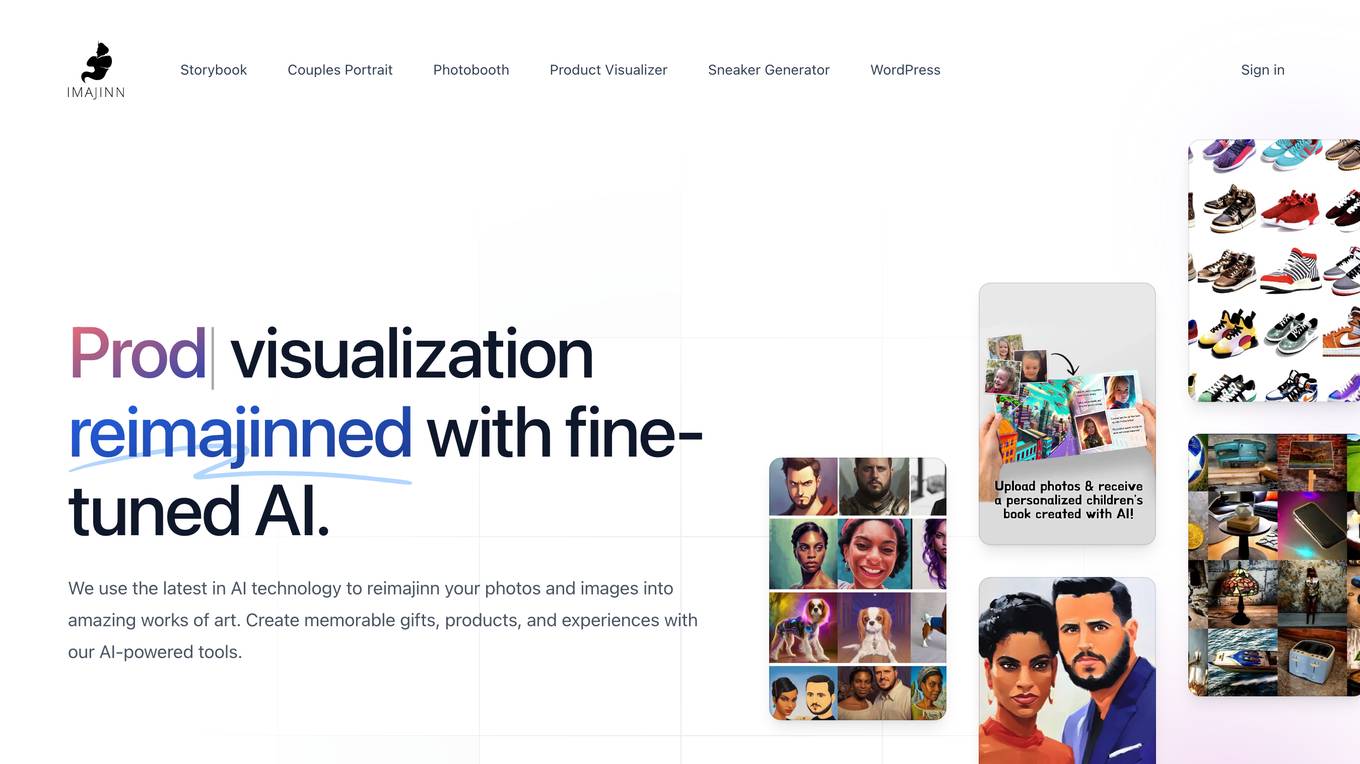
Imajinn AI
Imajinn AI is a cutting-edge visualization tool that utilizes fine-tuned AI technology to reimagine photos and images into stunning works of art. The platform offers a suite of AI-powered tools for creating personalized children's books, printed couples portraits, profile picture photobooth, product photo visualizer, and sneaker generator. Users can also generate concept images for various purposes, such as eCommerce, virtual photoshoots, and more. Imajinn AI provides a fun and creative way to bring ideas to life with high-quality outputs and a user-friendly interface.
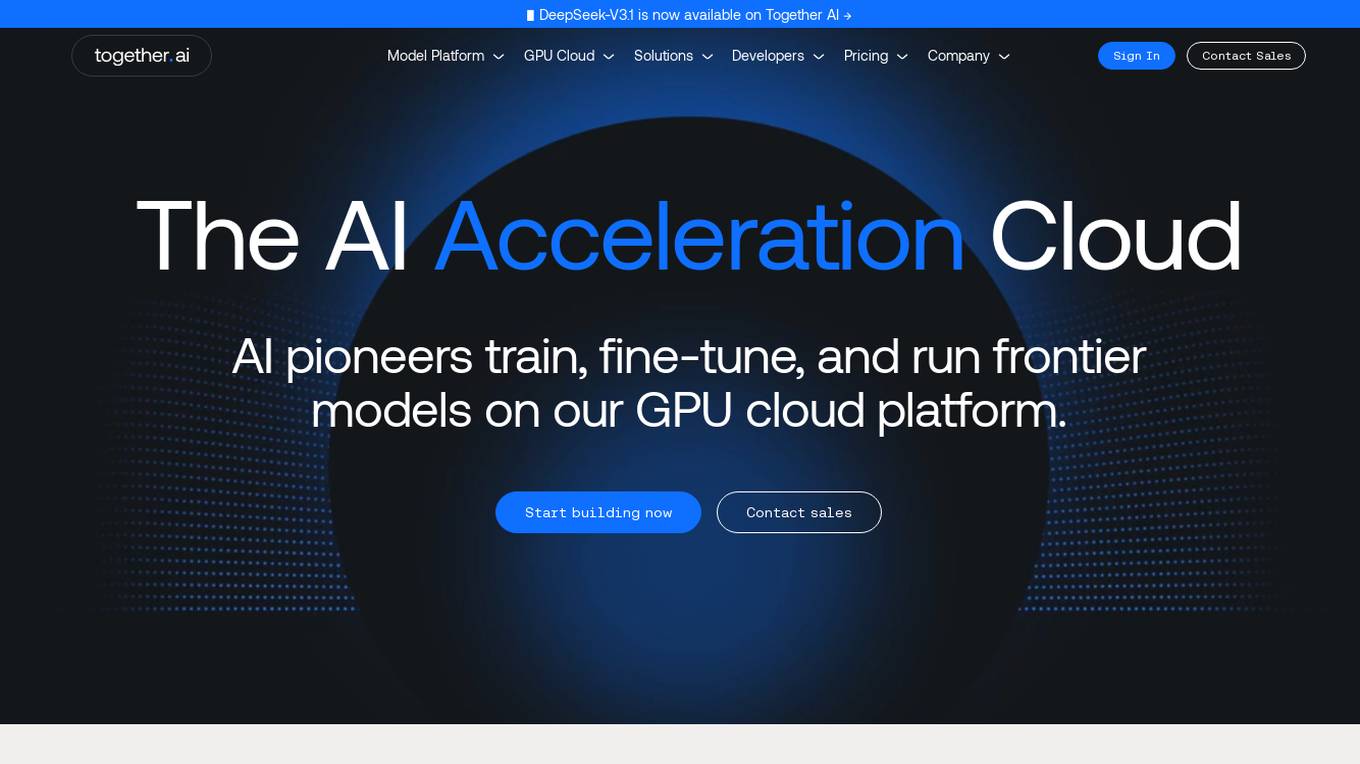
Together AI
Together AI is an AI Acceleration Cloud platform that offers fast inference, fine-tuning, and training services. It provides self-service NVIDIA GPUs, model deployment on custom hardware, AI chat app, code execution sandbox, and tools to find the right model for specific use cases. The platform also includes a model library with open-source models, documentation for developers, and resources for advancing open-source AI. Together AI enables users to leverage pre-trained models, fine-tune them, or build custom models from scratch, catering to various generative AI needs.
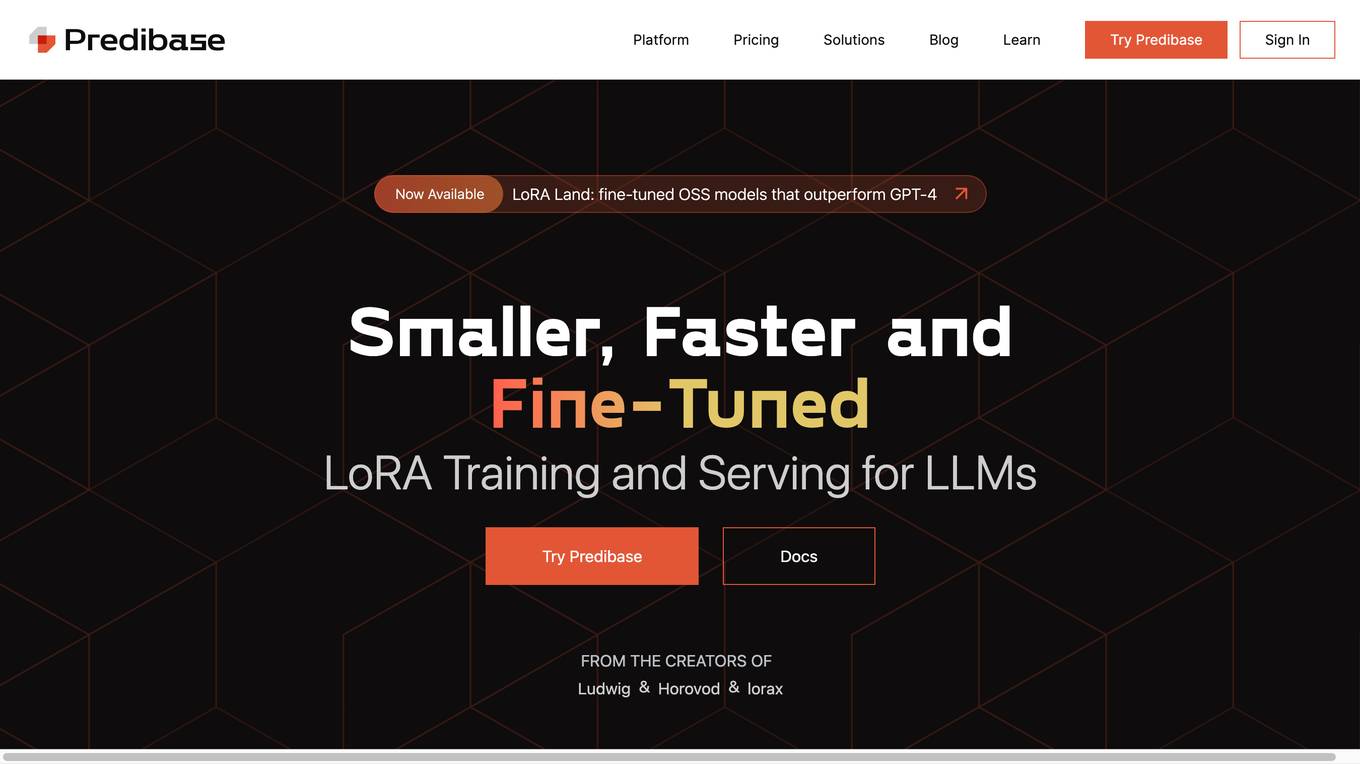
Predibase
Predibase is a platform for fine-tuning and serving Large Language Models (LLMs). It provides a cost-effective and efficient way to train and deploy LLMs for a variety of tasks, including classification, information extraction, customer sentiment analysis, customer support, code generation, and named entity recognition. Predibase is built on proven open-source technology, including LoRAX, Ludwig, and Horovod.
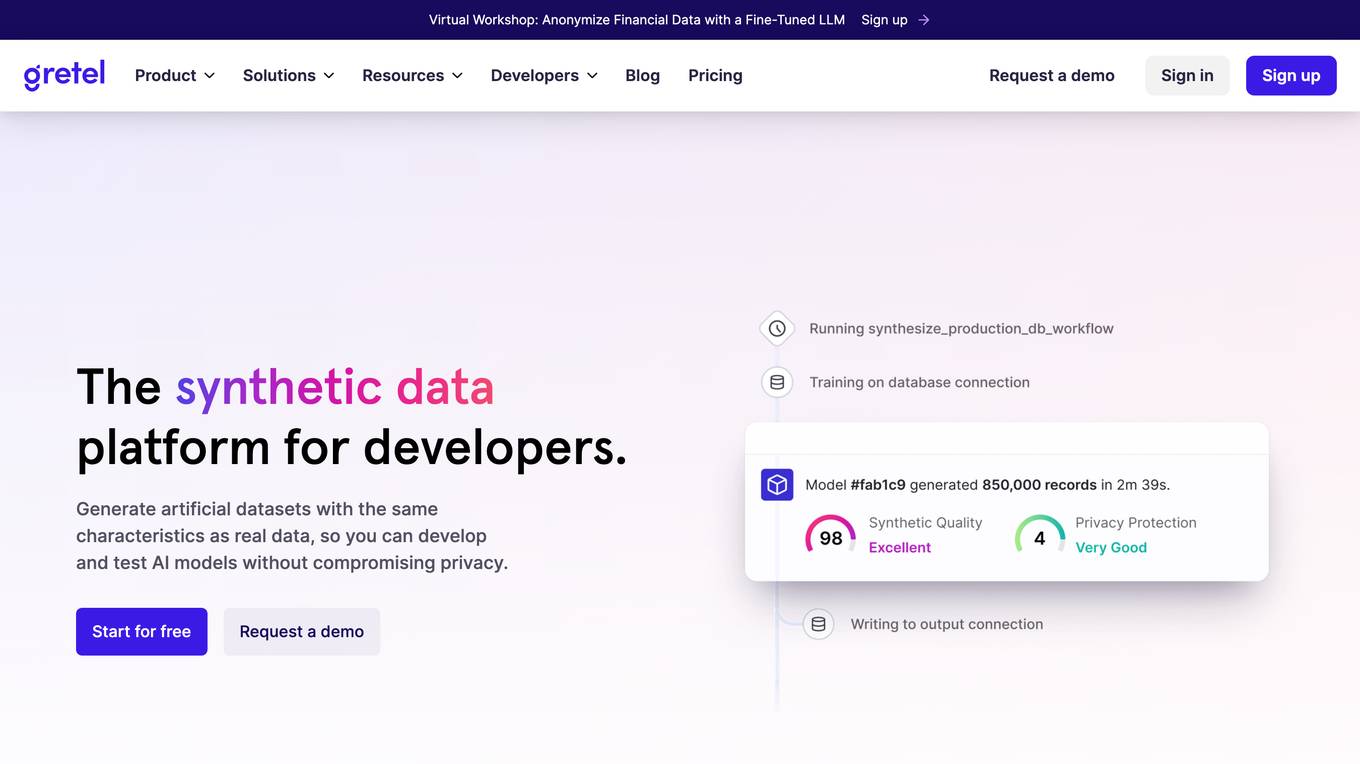
Gretel.ai
Gretel.ai is a synthetic data platform purpose-built for AI applications. It allows users to generate artificial, synthetic datasets with the same characteristics as real data, enabling the improvement of AI models without compromising privacy. The platform offers APIs for generating anonymized and safe synthetic data, training generative AI models, and validating models with quality and privacy scores. Users can deploy Gretel for enterprise use cases and run it on various cloud platforms or in their own environment.
7 - Open Source AI Tools

ray
Ray is a unified framework for scaling AI and Python applications. It consists of a core distributed runtime and a set of AI libraries for simplifying ML compute, including Data, Train, Tune, RLlib, and Serve. Ray runs on any machine, cluster, cloud provider, and Kubernetes, and features a growing ecosystem of community integrations. With Ray, you can seamlessly scale the same code from a laptop to a cluster, making it easy to meet the compute-intensive demands of modern ML workloads.
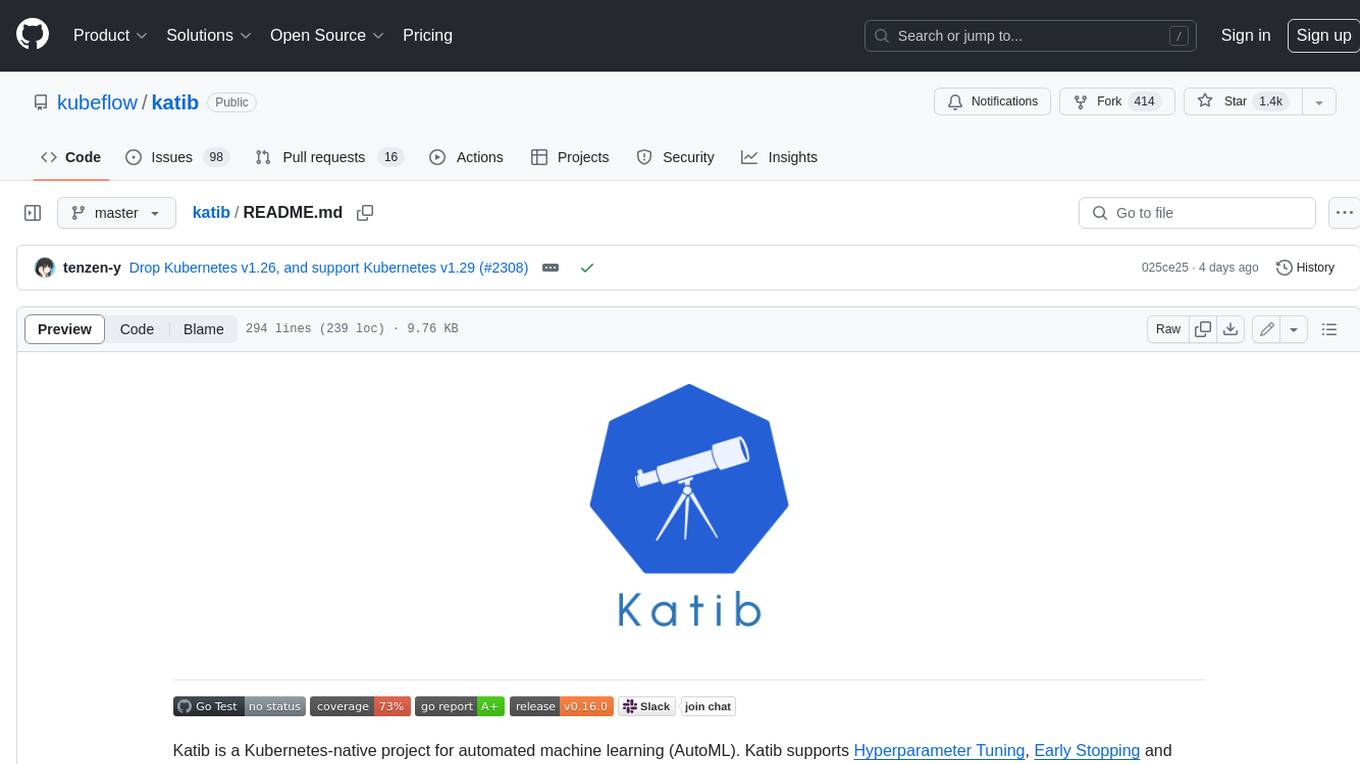
katib
Katib is a Kubernetes-native project for automated machine learning (AutoML). Katib supports Hyperparameter Tuning, Early Stopping and Neural Architecture Search. Katib is the project which is agnostic to machine learning (ML) frameworks. It can tune hyperparameters of applications written in any language of the users’ choice and natively supports many ML frameworks, such as TensorFlow, Apache MXNet, PyTorch, XGBoost, and others. Katib can perform training jobs using any Kubernetes Custom Resources with out of the box support for Kubeflow Training Operator, Argo Workflows, Tekton Pipelines and many more.
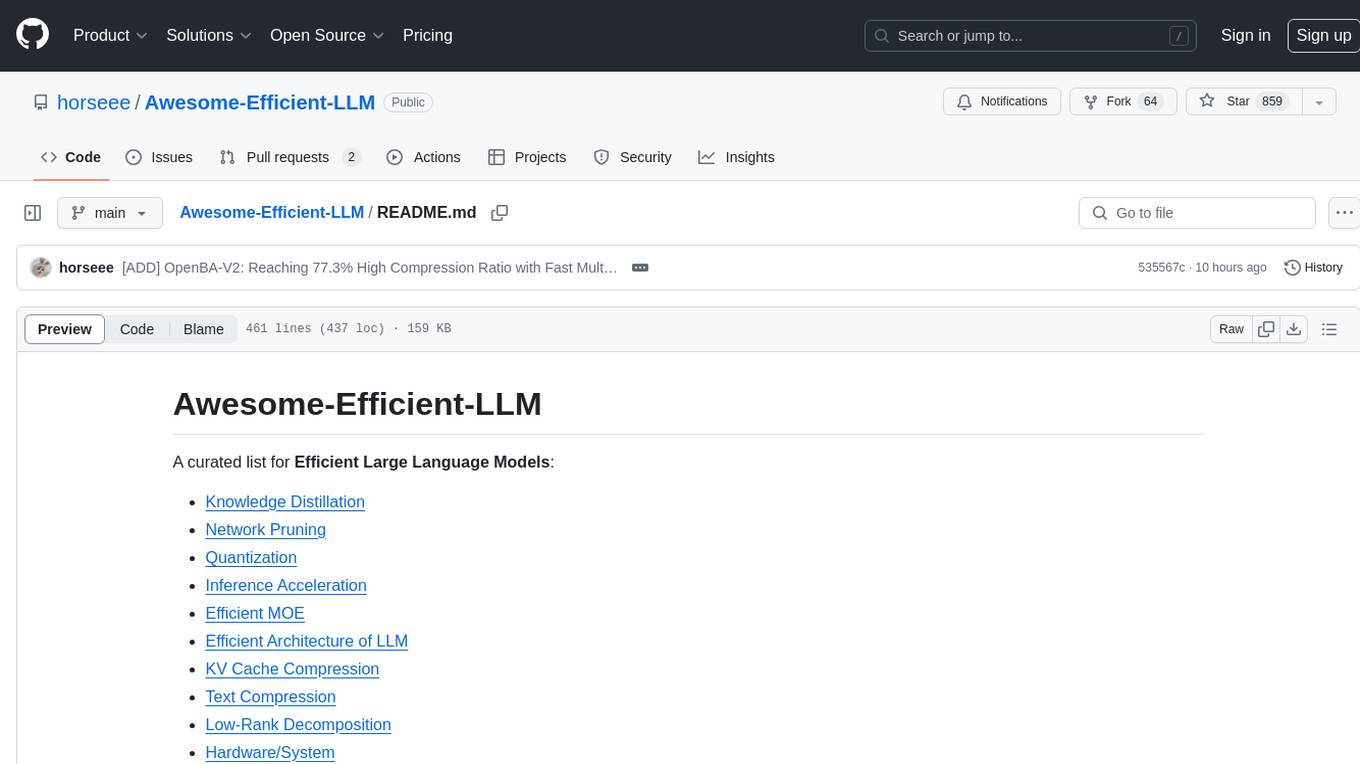
Awesome-Efficient-LLM
Awesome-Efficient-LLM is a curated list focusing on efficient large language models. It includes topics such as knowledge distillation, network pruning, quantization, inference acceleration, efficient MOE, efficient architecture of LLM, KV cache compression, text compression, low-rank decomposition, hardware/system, tuning, and survey. The repository provides a collection of papers and projects related to improving the efficiency of large language models through various techniques like sparsity, quantization, and compression.
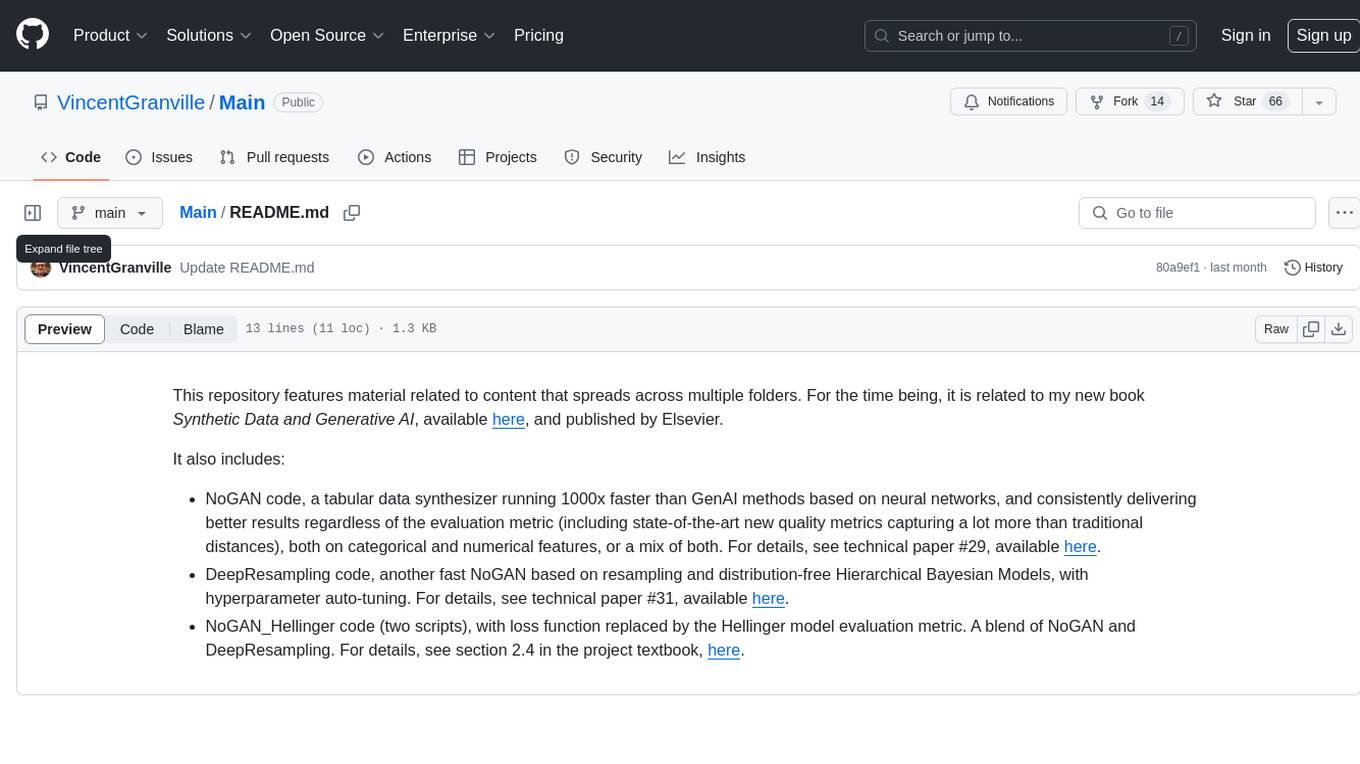
Main
This repository contains material related to the new book _Synthetic Data and Generative AI_ by the author, including code for NoGAN, DeepResampling, and NoGAN_Hellinger. NoGAN is a tabular data synthesizer that outperforms GenAI methods in terms of speed and results, utilizing state-of-the-art quality metrics. DeepResampling is a fast NoGAN based on resampling and Bayesian Models with hyperparameter auto-tuning. NoGAN_Hellinger combines NoGAN and DeepResampling with the Hellinger model evaluation metric.
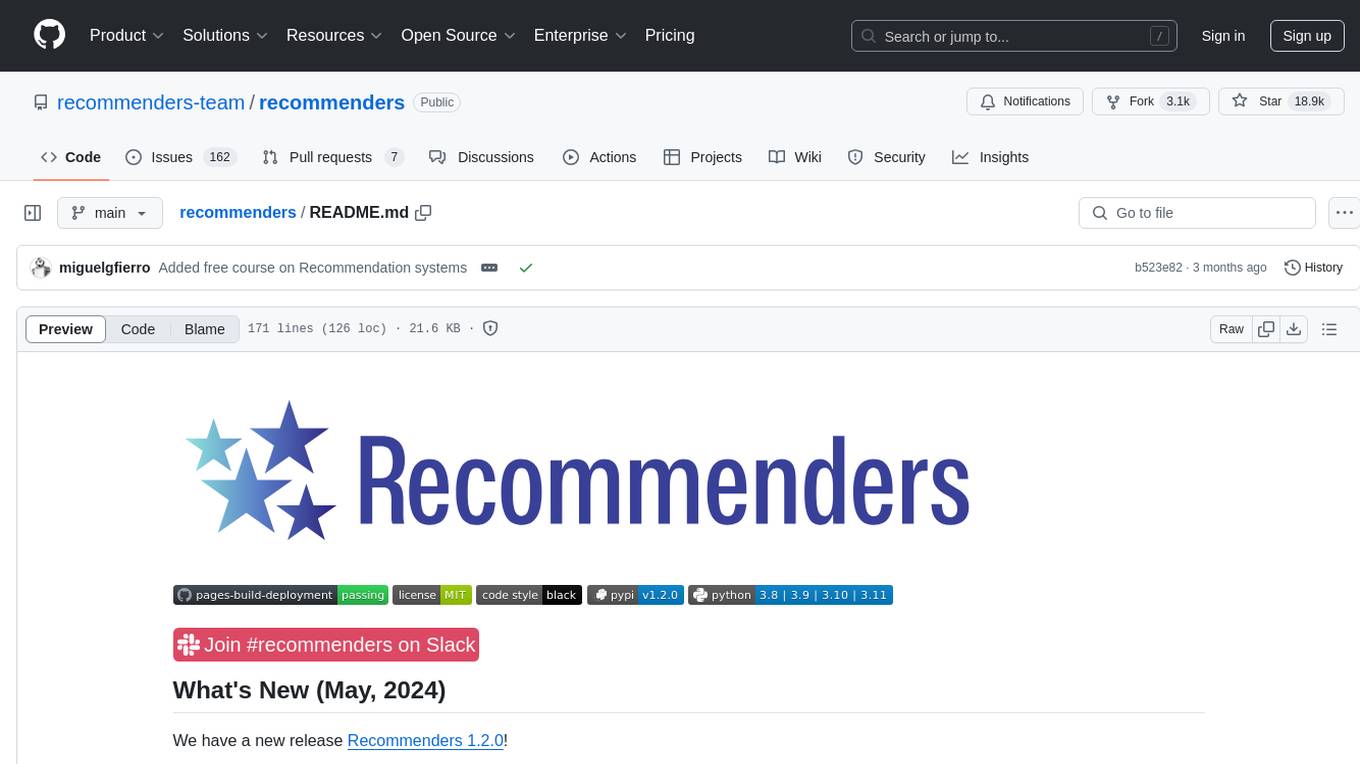
recommenders
Recommenders is a project under the Linux Foundation of AI and Data that assists researchers, developers, and enthusiasts in prototyping, experimenting with, and bringing to production a range of classic and state-of-the-art recommendation systems. The repository contains examples and best practices for building recommendation systems, provided as Jupyter notebooks. It covers tasks such as preparing data, building models using various recommendation algorithms, evaluating algorithms, tuning hyperparameters, and operationalizing models in a production environment on Azure. The project provides utilities to support common tasks like loading datasets, evaluating model outputs, and splitting training/test data. It includes implementations of state-of-the-art algorithms for self-study and customization in applications.
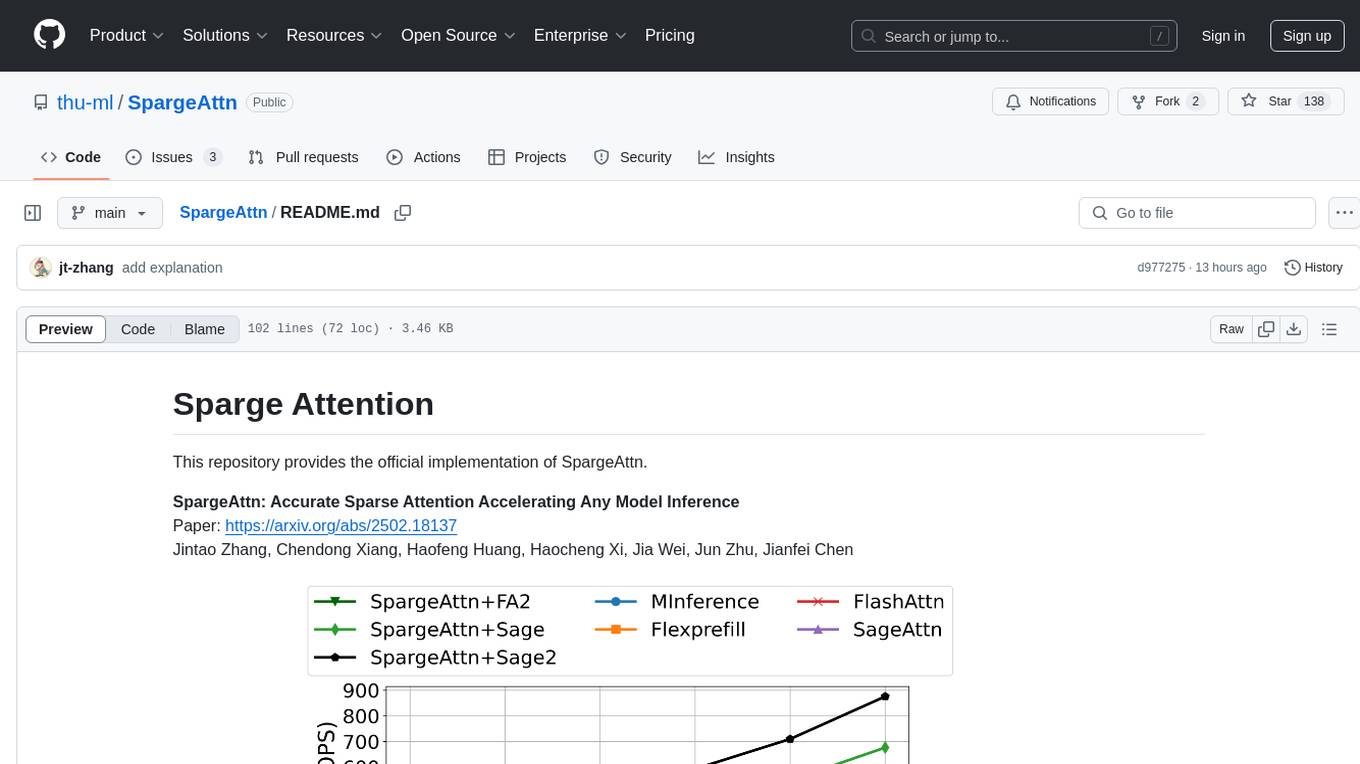
SpargeAttn
SpargeAttn is an official implementation designed for accelerating any model inference by providing accurate sparse attention. It offers a significant speedup in model performance while maintaining quality. The tool is based on SageAttention and SageAttention2, providing options for different levels of optimization. Users can easily install the package and utilize the available APIs for their specific needs. SpargeAttn is particularly useful for tasks requiring efficient attention mechanisms in deep learning models.
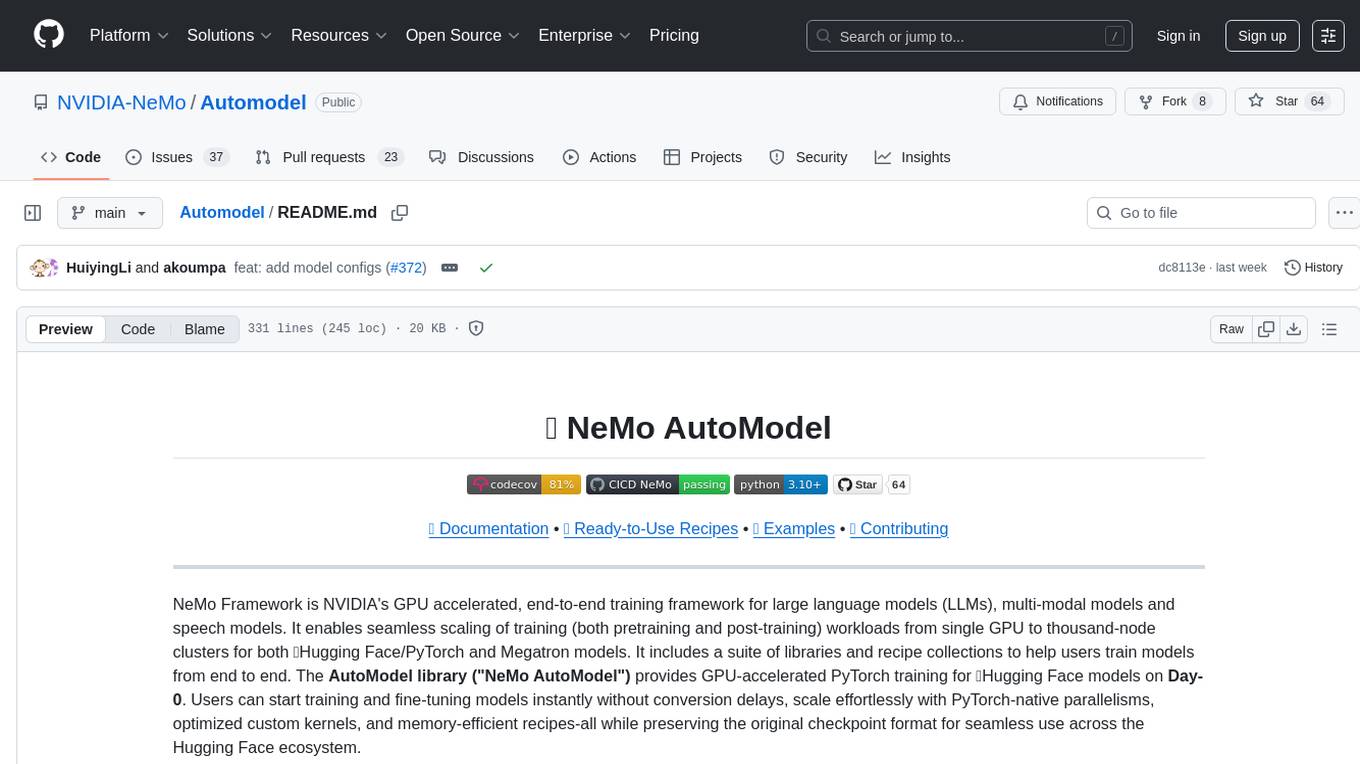
Automodel
Automodel is a Python library for automating the process of building and evaluating machine learning models. It provides a set of tools and utilities to streamline the model development workflow, from data preprocessing to model selection and evaluation. With Automodel, users can easily experiment with different algorithms, hyperparameters, and feature engineering techniques to find the best model for their dataset. The library is designed to be user-friendly and customizable, allowing users to define their own pipelines and workflows. Automodel is suitable for data scientists, machine learning engineers, and anyone looking to quickly build and test machine learning models without the need for manual intervention.
20 - OpenAI Gpts
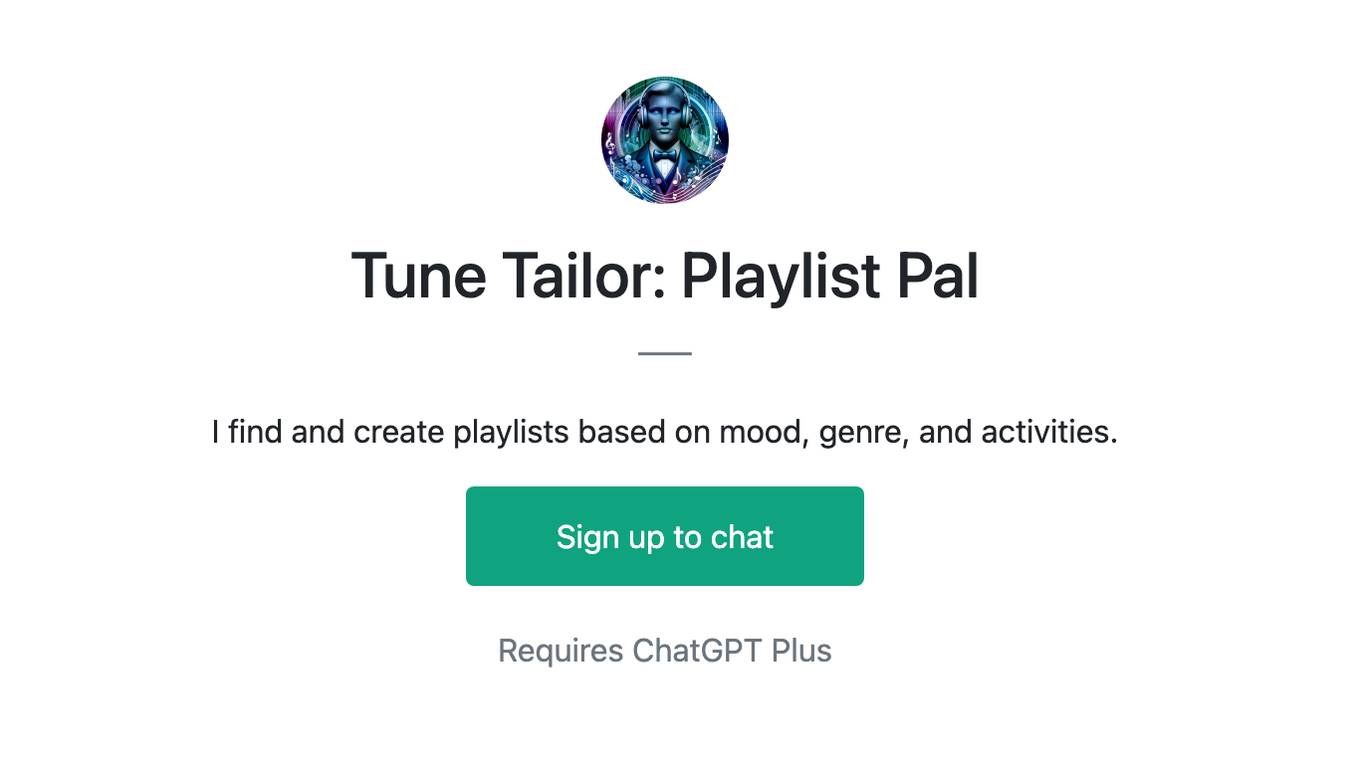
Tune Tailor: Playlist Pal
I find and create playlists based on mood, genre, and activities.
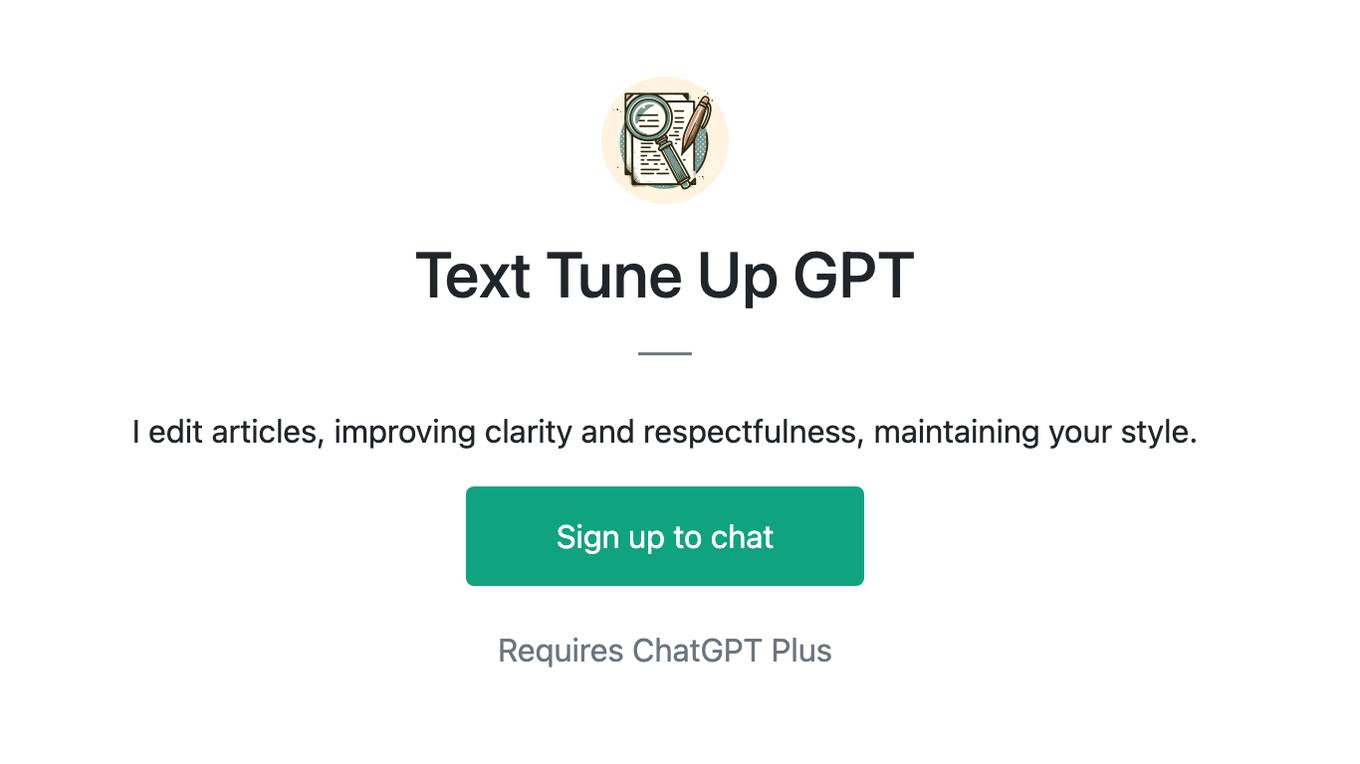
Text Tune Up GPT
I edit articles, improving clarity and respectfulness, maintaining your style.

The Name That Tune Game - from lyrics
Joyful music expert in song lyrics, offering trivia, insights, and engaging music discussions.

Joke Smith | Joke Edits for Standup Comedy
A witty editor to fine-tune stand-up comedy jokes.
Rewrite This Song: Lyrics Generator
I rewrite song lyrics to new themes, keeping the tune and essence of the original.

Dr. Tuning your Sim Racing doctor
Your quirky pit crew chief for top-notch sim racing advice

アダチさん12号(Oracle RDBMS篇)
安達孝一さんがSE時代に蓄積してきた、Oracle RDBMSのナレッジやノウハウ等 (Oracle 7/8.1.6/8.1.7/9iR1/9iR2/10gR1/10gR2/11gR2/12c/SQLチューニング) について、ご質問頂けます。また、対話内容を基に、ChatGPT(GPT-4)向けの、汎用的な質問文例も作成できます。

Drone Buddy
An FPV drone specialist aiding in building, tuning, and learning about the hobby.

Pytorch Trainer GPT
Your purpose is to create the pytorch code to train language models using pytorch

BrandChic Strategic
I'm Chic Strategic, your ally in carving out a distinct brand position and fine-tuning your voice. Let's make your brand's presence robust and its message clear in a bustling market.
